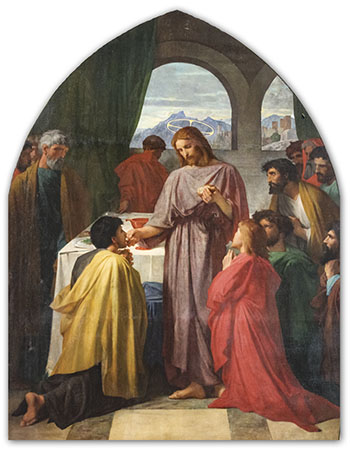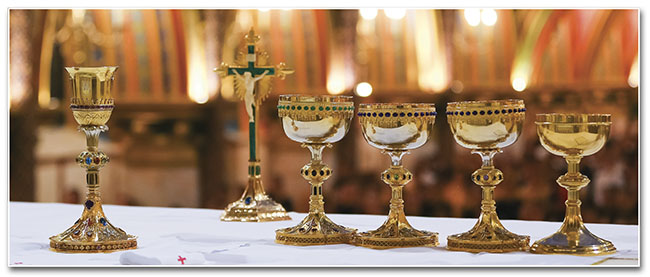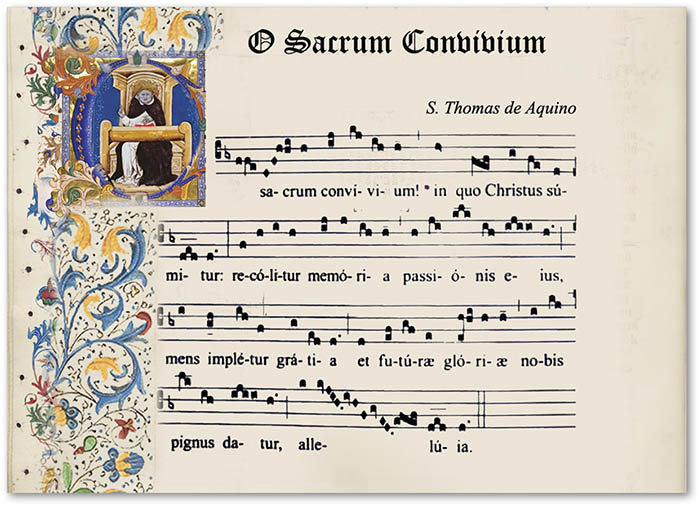In a certain period of childhood, numerous questions emerge in a child’s mind, questions that show the desire to investigate and understand the surrounding world: it is the famous age of the “whys”…
The youngster begins to navigate the mysterious seas of knowledge, and with each “discovery” feels the joy of yet another battle won, yet another area conquered! Among the wide range of questions that assail him, one that often arises is: “how can the eye, being so small, take in so many things, such as the vastness of the ocean, the immensity of the sky, the expanse of mountains? …”
And the little one spends his days searching for a convincing answer that will settle his doubt, which may take years to completely clarify, until, perhaps in a schoolbook, he learns how the human being’s optical system works. Only then does his mind rest, with the relief of having reached yet another conclusion!
Now, just as the eye has such a broad field of vision, God created certain souls with the capacity to summarize vast realities. So it was with certain scientists, philosophers, composers, poets and writers whose memory was immortalized because they marked history with their fabulous ingenuity.
Without any doubt, among these figures is the great St. Thomas Aquinas. It is hard to believe that a single mind could have explained so many truths! For his admirable intelligence combined with an eminent sanctity, he was praised by theologians, bishops and Pontiffs of every century, and with good reason Leo XIII compared him to a sun, because “he heated the world with the warmth of his virtues and filled it with the splendor of his teaching.”1
Theologian, poet and Saint
As seen in the biography that opens this sequence of articles on the Angelic Doctor, on the occasion of the institution of the Solemnity of Corpus Christi,2 Urban IV commissioned St. Thomas to compose the office of the celebration. However, exceeding expectations, the Saint-poet produced “a liturgical jewel that has defied seven centuries, and that perhaps we shall go on singing in eternal beatitude.”3 The set of prayers and hymns that compose it is considered “the most tender, devout and deeply theological known in the Sacred Liturgy.”4 From it we gained the Adoro te devote, the Lauda Sion and the Ave verum, among others.
As Biffi points out, St. Thomas not only masterfully elaborated his Eucharistic theology, but his “contemplation of the Eucharist was so intense that it brought out his poetic vein and infused the accents of lyricism into an irreproachable and refined dogmatic language, from which emerged sequences and hymns that we all know and still sing.”5
In this Office of Corpus Christi we find an antiphon that is small in size but giant in content: it is the famous O sacrum convivium.6 In it, in fact, St. Thomas7 points to the threefold reality that, as he says, every Sacrament embraces; that is, in relation to the past, the present and the future of our sanctification.
Let us consider each of these aspects in turn.
Institution of the Eucharist and Memorial of the Passion
“O sacrum convivium in quo Christus sumitur; recolitur memoria passionis eius – O sacred banquet, wherein Christ is received; the memorial of His passion is renewed.”
Here we find two intertwining acts: the institution of the Eucharist and the memorial of the Passion.
About to die, Our Lord Jesus Christ let His affection for His disciples overflow: “Now before the feast of the Passover, when Jesus knew that His hour had come to depart out of this world to the Father, having loved His own who were in the world, He loved them to the end” (Jn 13:1). And what was the setting chosen for this? A sermon in the synagogue? A discourse? No: a supper! A meal with friends and relatives holds an extremely affectionate and warm character: in it we socialize, bid farewell to a loved one or see someone again after a long separation… This was precisely the context that the Divine Savior chose for the final meeting with his own: a “sacred banquet”.
In addition to the convivial aspect, St. Thomas points to three theological reasons for the appropriateness of instituting the Eucharist at a supper. First, because Our Lord did not want to leave those whom He so loved; He accordingly left them not only a remembrance, but He left himself in the form of food: “When Christ was going to leave His disciples in His proper species, He left himself with them under the sacramental species.”8
The second reason lies in the need to have something that would represent for centuries to come the supreme act of love carried out by Jesus in His Passion.9 The then Cardinal Ratzinger10 commented that the words of the Divine Master at the Last Supper were an offering in advance, in which He measured all the consequences and accepted death. Therefore, in the Paschal Supper He made His offering, and on the Cross He consummated it. And so that this mystery might be remembered in perpetuity, He commanded: “This is my Body which is given for you. Do this in remembrance of Me” (Lk 22:19).

It is of the utmost importance to emphasize that the terms represent, recall and memorial are employed not as a remembrance evoked from the internal senses of memory or imagination, but in the sense of actualizing, making present the Passion of Christ in the Sacrament of the altar.
The Passover meal itself had this “actualizing” character for the chosen people: “The Jewish memorial does not limit itself to recalling the salvific acts performed by God in the past, but makes them present in the new circumstances. It is a rite which actualizes God’s saving action.”11 In the same way, the Eucharistic Supper not only recalls the offering and death of the Divine Saviour, but renews them in an unbloody manner on the altar.
Finally, as a third reason, St. Thomas explains that it was fitting that this Sacrament should be instituted at the Last Supper of Christ with His disciples, “because last words, chiefly such as are spoken by departing friends, are committed most deeply to memory; since then especially affection for friends is more enkindled.”12
Changed into God himself…
“Mens impletur gratia – the soul is filled with grace.”
The old adage says: “you are what you eat.” Now, if bodily health can be judged by the food eaten, what can be said of the effects produced in the soul of the person who is nourished by the very Body and Blood of Christ?
In bodily food, nutrients and vitamins are assimilated by the organism, becoming a constituent part of it, like blood, hair or muscle, for example. However, St. Thomas explains that spiritual food, that is, the Eucharist, has an different effect from the natural: it is not converted into our substance, but converts us into what we eat.13
In the Eucharist, it is not we who assume Jesus, the Second Person of the Blessed Trinity, but it is He who assumes us completely! Herein lies the particular effect and the specific grace of this Sacrament: the intimate union of man with Christ, so that the faithful, receiving Communion, can exclaim as the bride of the Song of Songs: “I am my beloved’s and my beloved is mine” (6:3).
This is why this Sacrament surpasses all others in excellence, for in it we receive not only an increase of sanctifying grace, but the very Author of grace, who promised: “He who eats my flesh and drinks my blood abides in Me, and I in him” (Jn 6:56).
Now, how often have we stopped to meditate on who this God is, into whom we are changed? In the words of the Beloved Disciple, “God is love” (1 Jn 4:8); therefore, when this God-Love assimilates us, we are transformed into His very charity… Thus we rightly call it the Sacrament of charity.
In this regard, Alastruey writes: “This union of man with Christ is obtained principally by the virtue of charity, which contains a powerful unitive and transforming force of the lover into the beloved.”14 Without, however, being hypostatic, substantial or physical, it is in this moral union that we conform our will and our affections to His.
Besides uniting us to Christ and incarnating in us the virtue of charity, other effects flow from the reception of this august Sacrament: it increases sanctifying grace by sustaining, restoring and delighting our souls, in a manner analogous to what food and drink do in the human organism; it pardons venial sins by the power of the action of charity; it prevents future sins, since charity diminishes concupiscence and demons are defeated by virtue of Christ’s Passion; it promotes union between the members of His Mystical Body.15
Such an intermingling is established by Communion, for since in this Sacrament we are united to Christ, the Head of the Church, there must necessarily be a reciprocal union of the faithful among themselves, as members of one Body: “We commune with one another and unite one with another.”16
Pledge of future glory
“Et futuræ gloriæ nobis pignus datur.” As we have already seen, in the Eucharist the Passion of Christ is renewed; nevertheless, this sacrifice only reached its culmination in the Resurrection. In the same way, the Eucharistic banquet will only have its definitive conclusion in Heaven, since for this Christ died and rose again. It is in this sense that St. Thomas ends the antiphon by saying that the Eucharist is given to us as a “pledge of future glory.”
“Christ’s Passion, in virtue whereof this Sacrament is accomplished, is indeed the sufficient cause of glory, yet not so that we are thereby forthwith admitted to glory, but we must first ‘suffer with Him in order that we may also be glorified’ afterwards ‘with Him,’ as Paul says, so this Sacrament does not at once admit us to glory, but bestows on us the power of coming unto glory.”17
Commenting on this passage of the antiphon, Torrell affirms that the “evocation of hope does not appear by chance since, if the celebration of the Sacrament is pervaded by the remembrance of the Passion, then it is also totally directed towards its fulfillment at the end of time, since it is the guarantee of future glory.”18
Lest anyone should think that the Kingdom of Heaven is won by personal effort, the Eucharistic Doctor explains that in this Sacrament we receive Him who, by virtue of His Death and Resurrection, has opened the gates of Paradise for us.19 And this eschatological effect of the Eucharistic Banquet is confirmed by Our Lord’s own words: “I have eagerly desired to eat this Passover with you […]. For I tell you, I will not eat it again until it is fulfilled in the Kingdom of God” (Lk 22:15-16).

Our union with Our Lord Jesus Christ and with the other members of His Mystical Body here on earth, through the Eucharist, is a foreshadowing of the happiness we will have in Heaven! If the company of those who love one another causes such joy in this life, what can be said of our full union with God and the blessed in eternity?
Sorrow and love: sacrifice that leads to glory
Now, what led God to give us so much? It was love! An immense, entire and complete love… truly infinite. A love for which He annihilated himself in favor of those loved, pouring out His Blood in being nailed to the Cross.
When true and pure love exists, it leads the one who loves to give himself entirely to the beloved, to the point that not even bodily life can stand in the way of such a gift. The Savior gave us the best example of this reality when He died and gave himself to us in Body, Blood, Soul and Divinity:
“Greater love has no man than this, that a man lay down his life for his friends” (Jn 15:13).
There was, therefore, a kind of “bridge” between the love manifested at the Last Supper and the holocaust consummated during the Passion. From this we can conclude that the Divine Master wanted to teach us that without suffering there is no love, since true love is proven only in sacrifice.
Let us give due value to this lesson of Our Lord which is renewed for us daily on the altars of the whole world, and let us embrace with generosity all the trials and crosses which Providence may send us, knowing that in the end we will receive a reward exceedingly great: perfect union with Christ in Heaven! ◊
Taken from the Heralds of the Gospel magazine, #189.
Notes
1 LEO XIII. Æternis Patris.
2 On August 11, 1264, Urban IV issued the Bull Transiturus de hoc mundo, by which he determined the solemn celebration of the feast of Corpus Christi in the whole Church.
3 FARRELL, OP, Walter; HEALY, STD, Martin J. El libro rojo de Dios según Santo Tomás de Aquino. Pamplona: Don Bosco, 1980, p.598.
4 RAMÍREZ, OP, Santiago. Introducción general. In: ST. THOMAS AQUINAS. Summa Theologiæ. 3.ed. Madrid: BAC, 1964. v.I, p.51.
5 BIFFI, Inos. L’Eucaristia in San Tommaso “Dottore Eucaristico”. Teologia, mistica e poesia. Siena: Cantagalli, 2005, p.9.
6 Cf. ST. THOMAS AQUINAS. Officium Corporis Christi Sacerdos. Vesp. II. Antiphona ad Magnificat.
7 Cf. ST. THOMAS AQUINAS. Summa Theologiæ. III, q.60, a.3; q.73, a.4.
8 Idem, q.73, a.5.
9 Cf. Idem, ibidem.
10 Cf. RATZINGER, Joseph. La Eucaristía centro de la vida: Dios está cerca de nosotros. 2.ed. Valencia: EDICEP, 2003, p.32.
11 SAYÉS, José Antonio. El misterio eucarístico. 2.ed. Madrid: Palabra, 2011, p.23-24.
12 ST. THOMAS AQUINAS. Summa Theologiæ. III, q.73, a.5.
13 Cf. Idem, a.3.
14 ALASTRUEY, Gregorio. Tratado de la Santísima Eucaristía. 2.ed. Madrid: BAC, 1952, p.225.
15 Cf. ST. THOMAS AQUINAS. Summa Theologiæ. III, q.79, a.4-7.
16 ST. JOHN DAMASCENE. De fide orthodoxa. L.IV, c.13: PG 94, 1154.
17 ST. THOMAS AQUINAS. Summa Theologiæ. III, q.79, a.2, ad 1.
18 TORREL, Jean-Pierre. Saint Thomas en plus simple. Paris: Cerf, 2019, p.81.
19 Cf. ST. THOMAS AQUINAS. Summa Theologiæ. III, q.79, a.2.

